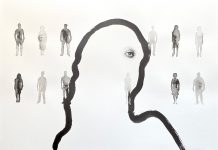
In August 1844, a New Englander by the name of Jonathan Norcross opened a sawmill at the corner of Decatur and Pratt streets; powered by a blind and ancient horse, it was the first manufacturing operation in Marthasville, the little town sprouting around the terminus of the Western and Atlantic railway.
Norcross had one big customer: the new Georgia Railroad. His mill churned out crossties, and he gave away scrap slabs of wood to poor mill workers. The cluster of cabins and shanties built using these remnants was soon known as Slabtown. Norcross ran the mill for one year, then moved on to new ventures, eventually opening his own store. Bonding with his fellow merchants and aspiring civic leaders, Norcross joined the movement to obtain a city charter and to change Marthasville’s name; Atlanta was the ultimate choice. Perhaps because of his upbringing as the son of a minister, Norcross wanted to set a moral tone for the fast-growing city.
This would not be easy. While the popular image of antebellum Atlanta is one of Southern charm and gracious manners, the railroad town had more in common with the Wild West. By 1850, the city of 2,500 was home to forty saloons. Criminals clustered in Slabtown and nearby Murrel’s Row, a stretch of Decatur Street where the primary enterprises were cockfighting and “groggery.” Even more notorious was Snake Nation, an enclave of log cabins and wood huts along old Whitehall Road (now Peters Street). It reportedly earned its nickname from snake oil peddlers, but was home to far more unsavory characters.
The battle between Atlanta’s merchant and railroad class and the Snake Nation toughs raged during the 1851 mayoral election. The first group founded the Moral Party, with Norcross as its candidate. Snake
Nation was loyal to the Free and Rowdy Party, which fielded a onetime city councilman and lawyer, who added a veneer of respectability. The Rowdies canvassed in saloons, winning support by picking up bar tabs. Norcross campaigned with more traditional public forums and wholesome handouts: apples and candy.
After winning the election, Mayor Norcross was saddled with an extra job—running police court. The Moral Party was eager to round up the Rowdies and throw them in Atlanta’s new jail, which replaced a log stockade so shoddily built that prison breaks were routine: Inmates either burrowed through its dirt floor or used brute force to simply topple the whole thing over. In the most audacious escape, friends of inmates came at night and lifted the stockade off the ground so the prisoners inside could crawl out. The new prison, constructed with a cement floor and prisoner-retaining frame structure, was escape-proof.
A few days into his mayoral term, Norcross held police court. First on the docket: a Rowdy accused of street fighting. Norcross issued a guilty verdict, levied a fine, and called for the next case.
Not so fast, said the sentenced man. He stood up and waved a “wicked-looking bowie knife,” threatening to butcher everyone in the court. Norcross grabbed his chair and brandished it like a lion tamer. The man with the knife slipped away in the chaos.
The next night, Rowdy Party members ventured to Decatur and came back hauling the city’s cannon—an artifact of the War of 1812. Decaturites fired the cannon to celebrate holidays, but the Rowdies had another idea in mind. They set up the cannon in the middle of the street, pointed it directly at Norcross’s store, and fired. Loaded with sand and gravel, the cannon caused a lot of mess but little damage. The Rowdies left a note: Resign, or the next shot will be serious.
For several weeks, Norcross and the city police arrested and imprisoned residents of Snake Nation and Rowdy Party ringleaders. When the jail filled, they put prisoners under house arrest.
Late one night, Moral Party faithful and deputized Atlantans swept into Snake Nation. Disguised under hoods, they entered houses and bars, whipping men and capturing women. The men were chased to the outskirts of town and the women loaded onto wagons and dropped off in Decatur. The “white cap” citizens’ brigade then made its way through Snake Nation and Slabtown, setting buildings on fire. In Slabtown, every house built from scraps of lumber that Norcross gave away burned to the ground; all of Snake Nation was destroyed.
The Slabtown area rebuilt quickly; Decatur Street remained Atlanta’s epicenter of drunk and disorderly goings-on into the early 1900s. But it would be years before anything was constructed on the ashes of Snake Nation. Eventually, just as Norcross had decades earlier, another merchant came to town. That man, Daniel Castleberry, opened a shop at the intersection of Peters and Fair streets, and in what would become a longstanding Atlanta tradition, the former Snake Nation was rebranded as Castleberry Hill.
This article originally appeared in our May 2014 issue.










![The North Carolina Museum of Natural Sciences’ newest exhibit is a [pre]historic first](https://cdn2.atlantamagazine.com/wp-content/uploads/sites/4/2024/04/DD-3-100x70.jpg)


